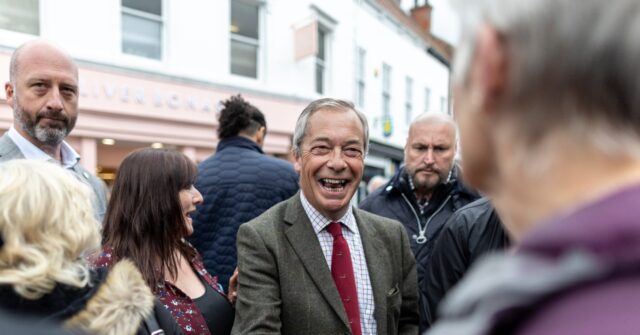A leading pollster has said that Nigel Farage’s Reform UK is on the precipice of triggering the most significant political realignment in over a century in Britain as voters are set to head to the polls for elections this week.
Research fellow at the National Centre for Social Research, Sir John Curtice, said that the traditional two-party Westminster establishment system is crumbling, with five parties now competing for votes, with Nigel Farage’s Reform leading the way by siphoning support from both Labour and the poorly named Conservatives.
Speaking to the Financial Times, the pollster said: “Politics is no longer one-dimensional… The conditions are there for the biggest challenge to the political conventions of British politics since the 1920s,” when the Liberal Party faded from political prominence in favour of Labour, who then represented a newly-enfranchised working class.
The remarks come just ahead of voters going to the polls on Thursday in 23 councils to select over 1,600 councillor seats and six mayors. Reform, which secured around 15 per cent of the vote in last year’s general election, has shot to the top of the polls in recent months as faith fades in both Labour and the Tories to deliver on key issues, such as the cost of living and mass migration, which Reform argues are interlinked.
Demonstrating the erosion of trust in the Westminster establishment, Professor Curtice stated that fewer than half of voters intended to vote for either of the main parties in the upcoming elections. “It has never been quite that low before,” he told The Independent.
Although he said measuring Reform’s likely performance is difficult given it has never waged a national campaign on the scale of the upcoming vote, Sir John said that the Farage-led party will likely win at least a “few hundred” seats throughout the country. He added that they “in a sense, have already won these local elections” given that in under a year, Reform has managed to field more candidates than any other party.
“Evidently, in the limited number of places we have elections, they have managed to create enough of an organisation to find 1,600 candidates, and they are fighting for more seats than any other party. Ukip never got to fighting more than 75 per cent of the wards in 2013, so they have already won an organisational battle.”
The elections will mark the first time that voters — although only around a third of them after the government “postponed” many elections until next year — will be able to give their verdict on the left-wing Labour government of Prime Minister Sir Keir Starmer since coming to power last July.
Reform has been actively targeting working-class areas, which have traditionally backed the left-wing party, but which voted for Brexit and have become disillusioned with Labour as it has shifted its focus towards a multicultural-urban elite coalition.
Farage has sought to win over such voters by capitalising on Labour’s failures to stem illegal immigration and its economic record of high taxes and low growth. The populist leader also surprised some by breaking with his earlier Thatcherite tendencies to call for the nationalisation of British Steel to protect union worker jobs after the firm’s Chinese owners attempted to shut down the country’s last significant steel-producing plant last month.
Indeed, Mr Farage told Breitbart News last year that Thatcherism is no longer relevant or useful to the modern British political conversation. He said then: “Thatcherite is irrelevant. It’s half a century old…. What I do think has happened over the last few decades is the power of the big corporate companies has got bigger and bigger.
“Capitalism is dead, it doesn’t exist, we’re living in corporatism. An unholy alliance of big business, big banks, and big government… I genuinely think we won’t get economic growth if the country is dominated by six giant multinationals, none of whom pay tax on-shore.”
Labour is not just facing challenges from Reform. Both the leftist Green Party, which has been attempting to peel off woke voters from Labour over issues like transgenderism, and the anti-Brexit Liberal Democrats, have been surging in support amid Labour’s decline. The Liberal Democrats are particularly strong in their structural campaign apparatus and threaten to make gains in the well-to-do areas of the South of England, including Cambridgeshire, Hertfordshire, and Oxfordshire.
Labour is also facing threats from outside the party system, with single-issue pro-Gaza candidates popping up across the country, as many Muslims have become disaffected with what they see as a weak response from Starmer on Israel. At last year’s general election, Labour lost five seats in Parliament to pro-Gaza independents, including former far-left Labour leader Jeremy Corbyn, who was ousted from the party over accusations of downplaying antisemitism within Labour.
However, it is still possible that Labour could see a net gain in the elections, given that Farage’s Reform Party has taken more support away from the Conservatives. According to Tory pollster Lord Hayward, the Conservatives may be on course for a major defeat this week, stating that they could lose as many as 525 seats out of the more than 900 the party is defending.
Such a defeat could spell trouble for recently-installed Tory leader Kemi Badenoch, who has yet to connect with the public and who continues to face a challenge from Shadow Justice Secretary Robert Jenrick, who has argued that the party should tack to the right on issues like immigration.
Follow Kurt Zindulka on X: Follow @KurtZindulka or e-mail to: kzindulka@breitbart.com
Read the full article here


